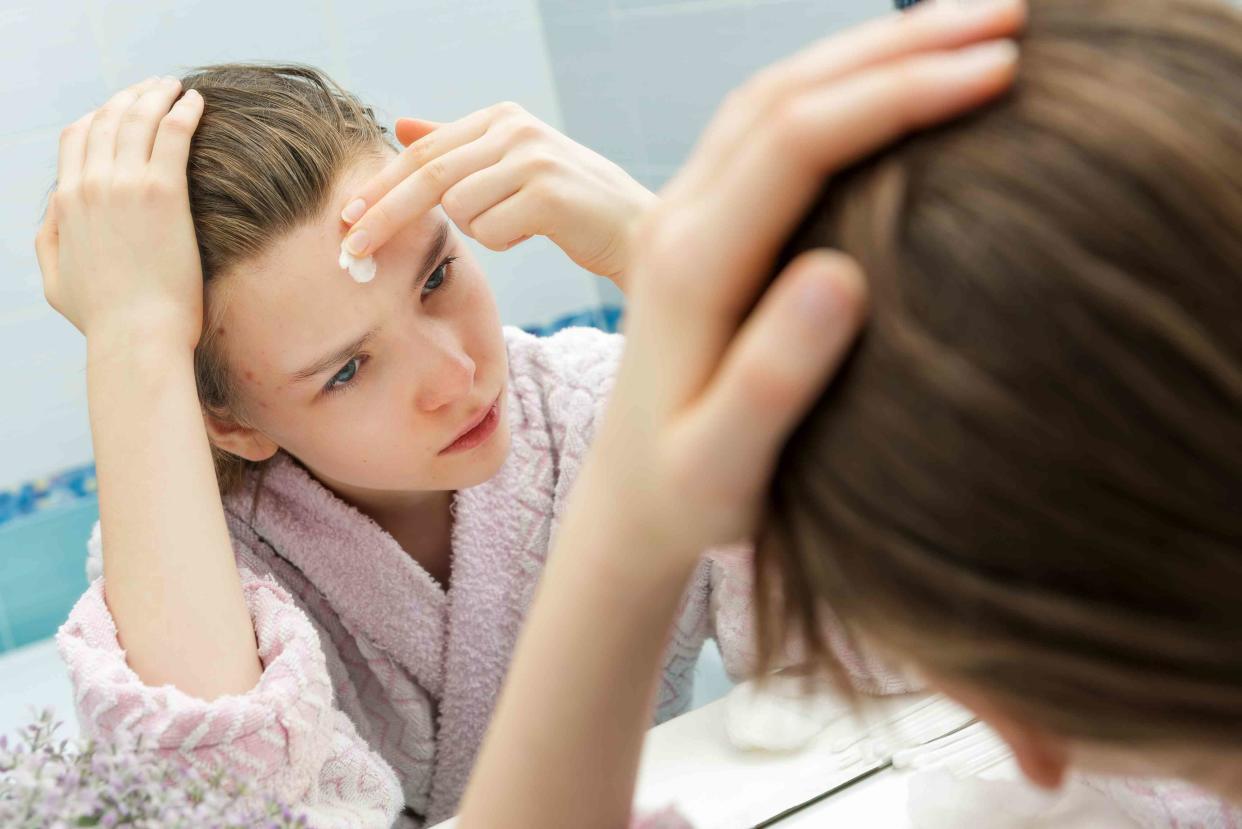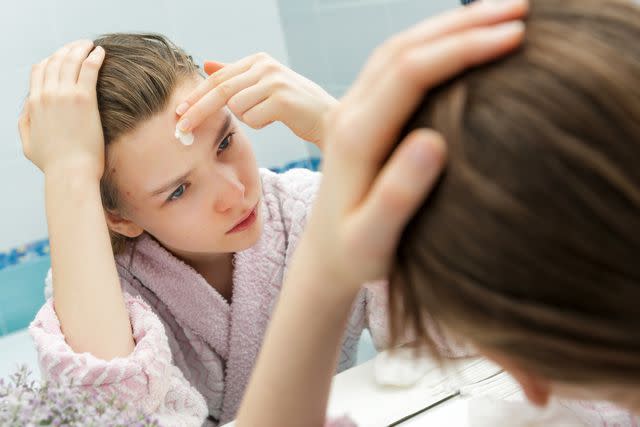What Causes Acne on the Forehead?

MihailUlianikov / Getty Images
Medically reviewed by William Truswell, MD
Forehead acne develops when glands just under the skin on the forehead become clogged with sebum (oil), bacteria, and/or dead skin cells. Common types of acne (also called acne vulgaris) include whiteheads, blackheads, and pimples. Painful cysts can develop if acne occurs deep in the skin.
Acne can develop anywhere, but it’s especially common on the face and shoulders. Many people notice acne on their forehead. The forehead is part of what dermatologists refer to as the T-zone, which also includes the nose and chin.
This article discusses forehead acne as well as how to prevent and treat it.

MihailUlianikov / Getty Images
What Causes Acne on the Forehead?
Forehead acne has the same possible underlying causes as acne that appears elsewhere on the body.
Pimples develop when sebaceous glands — which produce an oily substance called sebum — become blocked by excess sebum or other debris such as bacteria and dead skin cells.
Factors that increase the likelihood of acne and pimples developing include:
Hormonal changes: Hormonal changes—particularly an increase in male sex hormones, or androgens—often cause the sebaceous glands (oil glands) to enlarge and produce more oil, which leads to acne.
Medication: Certain medications, such as synthetic hormones and corticosteroids, may cause acne as a side effect.
Vitamin deficiencies: A 2016 study found that around 50% of subjects with acne had a vitamin D deficiency, compared to just 23% of the healthy controls.
Hair products: If you tend to break out along your hairline, oily hair care products may be the culprit. The type of acne caused by cosmetic products is known as acne cosmetica. If possible, avoid oily products like pomade, as well as potentially irritating shampoos and conditioners. It’s also important to wash your skin and hair regularly, as well as any household items that your hair care products touched (such as pillowcases and bedsheets).
Skin irritation: Forehead acne is often caused by skin irritation or trapped sweat. This may be due to cosmetic products, such as makeup, or tight clothing and accessories, such as hats, visors, or headbands.
Skin type: Some people have larger pores and/or excess oil production in the T-zone area of the skin, which includes the forehead.
Is Forehead Acne Stress Acne?
The relationship between acne and stress hasn't been well-studied, but one small study in healthcare workers during the COVID-19 pandemic found that stress was associated with an increase in acne, including forehead acne.
Related: What Causes Acne?
When Is Acne on the Forehead Hormonal?
An increase in androgen levels is a frequent cause of acne. You may be experiencing hormonal acne breakouts if you notice more forehead acne during:
Puberty
Perimenopause
Pregnancy
Periods
Hormonal acne may also be related to stress or certain disorders, such as polycystic ovarian syndrome (PCOS). It can also crop up when you start to take hormonal birth control.
Related: Hormonal Acne: What You Should Know
How to Get Rid of Forehead Acne
Forehead acne can be frustrating, but there are many effective treatment options—including home remedies and over-the-counter (OTC) medicines as well as prescription medications.
Home remedies that can remove forehead pimples include:
Aloe vera: Studies have found that aloe vera gel can help with moderate acne, especially inflammatory acne.
Tea tree oil: Recent research indicates that products containing tea tree oil, such as tea tree oil gel, can treat mild to moderate acne.
Zinc: There’s some evidence that people with acne have lower levels of zinc in their blood. Zinc supplements and/or topical zinc may help to relieve symptoms.
There are many OTC acne relief products on the market, from topical creams and ointments to face wash and masks. Look for products that contain one or more of the following ingredients:
Salicylic acid
Azelaic acid
Adapalene
If your acne is persistent, severe, deep, or painful, you might need to reach out to a healthcare provider. Your dermatologist may recommend one of the following prescription treatments:
Topical antibiotics
Oral antibiotics
Hormonal therapy, such as spironolactone or birth control pills
Laser or light therapy
Chemical peels
Related: How Acne Is Treated
How to Prevent Forehead Acne
There are many self-care tips you can follow to prevent forehead acne from developing or getting worse. Take the following steps to protect and care for your skin:
Try to refrain from touching, leaning on, picking at, or rubbing your face excessively.
Cleanse your skin thoroughly with a mild face wash at least once a day. However, don’t over-wash your skin or exfoliate it too often.
Wash your hair regularly.
Remove all of your makeup every night.
Don’t wear tight hats or hair accessories, especially while you work out.
Steer clear of hair care products that contain a lot of oil. Look for skin and hair care products whose labels contain phrases such as non-comedogenic, non-acnegenic, water-based, won’t clog pores, or oil-free.
Summary
Forehead acne has many potential causes, including pore-clogging hair products and skin irritation from hats or makeup as well as stress, hormonal changes, and certain medications. Home remedies and OTC treatments can resolve many cases of mild to moderate acne.
If your acne is affecting your overall well-being, don’t hesitate to reach out to a dermatologist. There are effective treatment options available even for severe cases of chronic acne.

